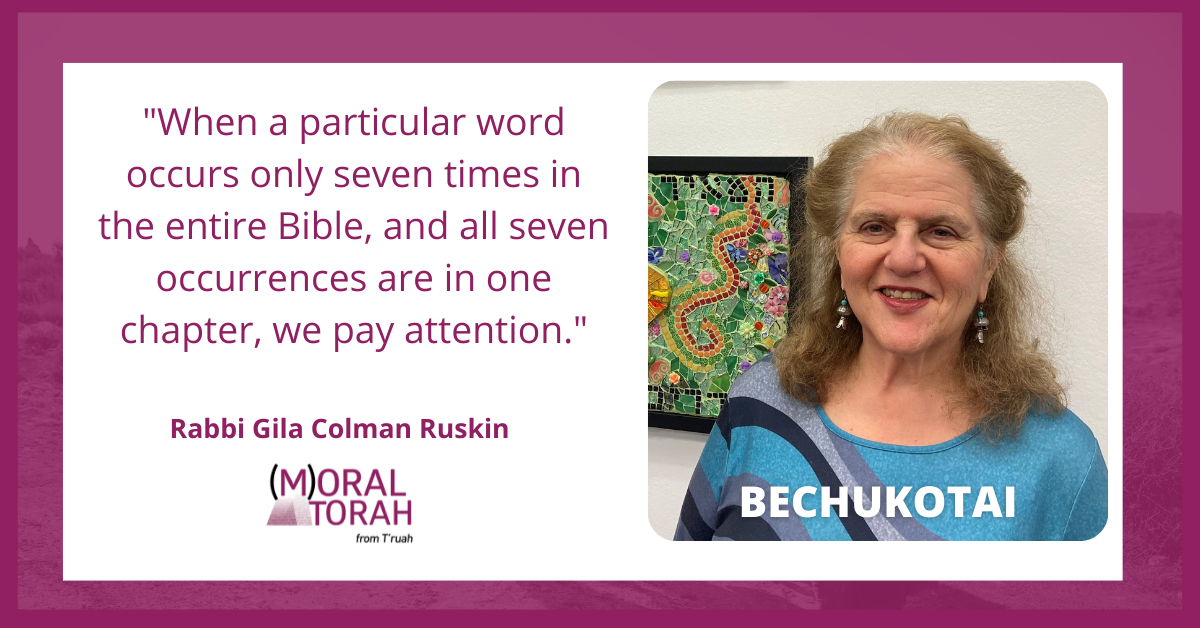A D’var Torah for Parshat Bechukotai by Rabbi Gila Colman Ruskin
When a particular word occurs only seven times in the entire Bible, and all seven occurrences are in one chapter, we pay attention. Something important is being communicated. The word keri (kuf–resh–yod) serves as the justification of the dreadful curses in Parshat Bechukotai. If we behave towards God with keri, then God will behave towards us with keri (Leviticus 26:27-28).
Sign up to receive (M)oral Torah in your inbox each week.
Translations vary widely because of difficulty pinpointing the root of keri. Is it from the root kuf-resh-resh (“cold”), suggesting the translation “hostility” found in the new JPS and RSV translations? Rashi understands the root to be kuf-resh-hey, implying a chance occurrence. (Indeed, in later Rabbinic Hebrew the word keri is associated with the chance occurrence of nocturnal emissions.) The old JPS and KJV render keri “contrary.” If we behave in a contrary manner toward God, then God will behave in a like manner toward us.
What could we do to God that is so hostile, contrary, or random that it warrants the curses of pestilence, cannibalism, or mauling by beasts described in chapter 26 of Leviticus? Perhaps what keri implies is a lack of intentionally righteous, consistent connection with the Divine and fulfillment of the covenant. Keri may imply that although we might occasionally show up for community, family, and ritual, we do not consider covenantal behavior to be incumbent upon us on a daily, weekly, monthly basis. The very idea of having an obligatory covenantal responsibility is either offensive to us as a violation of “free choice” or “too coercive.”
In the words of the late Rabbi Jonathan Sacks: “To be a Jew is to have faith that our individual lives and our collective history have meaning. Life is not mikreh, mere chance. It is a story of which you are a part, a question to which you are the answer.”
Let’s look at one very accessible example: the imperative to give tzedakah on a regular basis, which evolves throughout history. Biblical command required leaving the corners of the field; Talmudic law required giving to destitute brides, food banks, and funeral expenses; later responsa set a specific minimum of 10% of our income and a maximum of 20%, except for the very wealthy. Yet modern sensibilities consider it improper to dictate amounts of financial donations and to which specific charities.
Find more commentaries on Parshat Bechukotai.
Tzedakah is as essential as it has ever been. How should we respond as Jews, attuning to our times? We may debate the details, but ignoring our covenantal obligation to attend to the needs of humanity is, in my mind, a manifestation of keri.
Or, if you prefer, another take on keri and covenantal obligation in the 21st century:
Tikkun Olam in Modern Times
Remember when she and I marched against mining harbors in North Vietnam and then on Freedom Sunday for Soviet Jews
and then with a million moms against guns?
Remember when we campaigned for recycling bins
in the cafeteria in our kids’ school
and schlepped them in our station wagons?
Remember when we sat on the board of the Center for Jewish Education?
Remember when we posted flyers in synagogue ladies’ rooms for Abuse Survivors with the phone number of Jewish Family Services?
Her kids now suggest that for her 70th birthday, we all pitch in to buy a goat in her honor for an African family. Of course, I will.
And then she posts on Facebook, can you give $100 to research her brother’s disease?
Of course, I will.
It’s so easy with PayPal…
Now we just click….
writing texts to Get Out the Vote in PA
And clicking on petitions
to remove Ginni from the Library of Congress Trust Fund Board
Click to cancel student debt
and to raise the minimum wage
Click to phase out super pollutants
And to restore the child tax credit
Click on the breast cancer site for free mammograms
And for a monthly donation to Planned Parenthood
Click, click, and click
But it’s a fine spring day so I get myself up and out for a walk
He stands outside the CVS, “Excuse me miss,” he calls
What can I get for you, I ask?
“Laundry detergent, a bar of soap, and some orange juice,” he answers.
Of course, I will.
Handing over the bag with those three, I feel I’ve earned the right to inquire
Where do you live?
“In a group home about a mile from here, miss
And we’re all out of laundry detergent for the month, and we need some soap for the shower, and they stopped giving us real juice, only that sugary stuff.
Sometimes I can find some in the free fridge at Malcolm X park, but not today.”
I hand him a $5 bill
No, miss, that was all I need.
Thank you, and God bless.
I call my friend and tell her what I gave in her honor.
Rabbi Gila Colman Ruskin is passionate about creating midrash mosaics. She is rabbi emerita at Temple Adas Shalom in Havre de Grace, Maryland, and currently lives in West Philadelphia caring for her extended family including children, grandchildren, and her 99-year-old mother.

